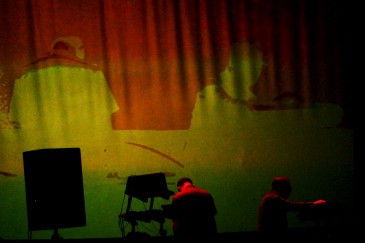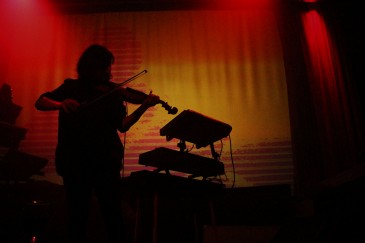
There’s a wonderful play in Davachi’s music. It suggests the workmanlike deployment of the tools at hand (all that gear) and the focus towards sound. But that sits alongside the luxurious passages that call for a contemplative, dwelling within.
For that to come through there has to be a commitment from the purveyors — it’s a good faith relationship. The record release show of Sarah Davachi’s debut, Barons Court, commanded such commitment: she is, to quote Alan Ranta’s quicker to the punch and better review of the show, “a treasure.”
As he concludes, Davachi warrants increasing attention: and it seems things are going pretty well. As for me — what shall I do in light of my immediate obsolescence? What does this review offer that others don’t?
Well, let me tell you that Discorder‘s got the hottest scoops on the opening set from Kensington Gore. Indeed, you will find their live multi-track composition makes for an excellent experience, and amateur explication at the hands of this witless writer.
But as I was saying, commitment moves us.
Stephen Wood and Scott Gubbels, a.k.a. Kensington Gore, played a long-form song — much of it improvisation according to and around a general compositional idea and inevitable crescendo. Although discrete from the shorter pieces on their album, the layers of modulating synth were there, as was the minimalism. In many senses the set was the improvisational element of their songs writ large. And the tonal palate was more tech-dystopian — reminiscent of the track “Bioplasmic Sequences” off Kensington Gore.
Electroacoustic squawks and quivering frequencies, along with twin percussive drivers — shuddering synth and sampled acoustic drum beats — heightened the aforementioned totalitarian edge. This all made the extra-performative hiss of the fog machine sound very apt. Nonetheless, this mechanical palate never fully subsumed the psychedelic play or the elating climb of the central melody.

As Kensington Gore played, Richard Smith’s visuals projected onto the stage. They enunciated a warped VHS-saturated nostalgia, sourced from a live capture of the artists which was then rendered through a shifting color spectrum. At one point, the contrast darkened Wood’s glasses into shades — it was a nice bit of noir.
These visuals continued into the next set. While mostly unchanging in purely visual appearance, Davachi gave the projection a more solemn connotation: the exact kind of slow play and transformation that she practices in her music.
Davachi’s set was more ascetic than Kensington Gore’s, and also more invested in the unfolding of spontaneous acoustic tones — specifically, that of a violin’s.
Starting with delicate plucks and then droning bows, these sounds were fed into her sequencer and looped. Having formed this rich series of tones, she then set down her violin and set to modulation before concluding by rising and playing another series of spontaneously sequenced bows — this time more dissonant, but nonetheless rigid. Throughout, as tracks entered and exited, the floating in of old samples — the looping of memory and time — or the modulation and expansion of drones, had a sonorous wealth: so much from so little. Davachi’s drone exploded the basic: making conventional noise surreal, and projecting the beauty of the micro on a large canvas.
Thinking back to the set, I also remember, again, the occasional hiss of the fog machine or the constant scooping of ice at the bar. Davachi’s set, or Gores’ for that matter, didn’t really have the amplitude or cacophony necessary to obscure these noises. Yet, that common focus on raw power belies the value of investment. People can’t be looking for excuses to be distracted — they have to want to engage.
I don’t think it’s elitist, or a tall task. It is in fact a deferral of pretense for one to open oneself up to the micro-level beauty in music: the ambiguity and pleasure of tones. Davachi’s excellent show was a wonderful example of this communal commitment: a collective gathering towards a distilled moment in time.

